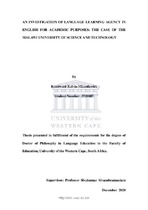| dc.contributor.advisor | Sivasubramaniam, Sivakumar | |
| dc.contributor.author | Mkandawire, Kondwani Kelvin | |
| dc.date.accessioned | 2021-03-18T08:02:13Z | |
| dc.date.available | 2021-03-18T08:02:13Z | |
| dc.date.issued | 2020 | |
| dc.identifier.uri | http://hdl.handle.net/11394/7994 | |
| dc.description | Philosophiae Doctor - PhD | en_US |
| dc.description.abstract | There is general recognition regarding the importance of English for Academic
Purposes (EAP) courses in assisting students acquire academic discourses appropriate
to specific disciplines of study. However, undergraduate students in multilingual
contexts, where English is a second or foreign language face challenges in managing
the transition from secondary school into the university, where they are expected to
appropriate as well as acclimate to new discourses of communication deemed to be
essential for their survival in the academic world. Although studies show the
importance of agency in language learning success, institutional demands have
sometimes led to the adoption of teaching and assessment practices that ignore the
learners’ English language learning history, background, experiences and needs, which
impact on their sense of agency and voice in the EAP classroom and eventually their
learning success. | en_US |
| dc.language.iso | en | en_US |
| dc.publisher | University of Western Cape | en_US |
| dc.subject | Affordances | en_US |
| dc.subject | Agency | en_US |
| dc.subject | Critical pedagogy | en_US |
| dc.subject | English for academic purposes | en_US |
| dc.subject | Learner empowerment | en_US |
| dc.title | An investigation of language learning agency in English for academic purposes: The case of the Malawi University of Science and Technology | en_US |
| dc.rights.holder | University of Western Cape | en_US |

